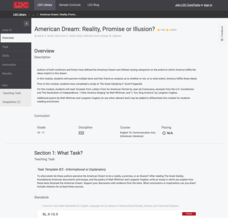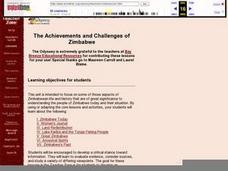School Improvement in Maryland
Dividing the Powers of Government
Who does what? To develop an understanding of the balance of power between the US federal and state governments, class members research responsibilities in terms of legal systems, security issues, economic activities, lawmaking, and...
Literacy Design Collaborative
American Dream: Reality, Promise or Illusion?
Dream or nightmare? Class members craft a synthesis essay with textual to determine to what extent the United States has fulfilled the ideas embodied in the America Dream.
Curated OER
Freedom, Rights, and Responsibilities
Students look at the primary sources that emerged from the Exodus (the Ten Commandments) and the War of Independence (the Declaration of Independence) and examine how each attempts to construct a free society and a definition of freedom....
Curated OER
The Kansas-Nebraska Act of 1854: Popular Sovereignty and the Political Polarization over Slavery
Students read selections from the Declaration of Independence, Northwest Ordinance of 1787, and the Wilmot Proviso of 1846. They contrast the maps of 1820 and 1854 to analyze developments in the national debate over slavery. They...
Curated OER
Bill of Rights: Rights and Responsibilities
Students explore the meaning of freedom. In this U.S. History lesson, students research the Declaration of Independence and how it relates to American freedom by completing activities and a mock trial.
National Endowment for the Humanities
Cultural Change
High schoolers research the passage of the 19th Amendment as an illustration of the mutual influence between political ideas and cultural attitudes. They also read the Seneca Falls Declaration and explore the cultural shifts it both...
Close Up Foundation
Rights Auction
In an engaging activity on universal and unalienable rights, learners work in groups to establish a democratic nation and determine what principles they want to protect to ensure a democratic society. They conduct a "rights auction" in...
A&E Television
Thomas Jefferson: Teachers Guides
Thomas Jefferson remains one of the most fascinating figure in American history, both for his innovative contributions to the United States government and his remarkably contradictory personal life. A series of discussion questions and...
Facing History and Ourselves
Standing Up to Hatred on Cable Street
The final lessons in this section of the Standing Up for Democracy unit ask class members to consider ways they can help create a "more humane, fair, and compassionate environment" in their communities. For context, learners study how...
Heritage Foundation
Congress's War Powers
Declaring war is not as easy as some may think. High schoolers learn about Congress's limits regarding war by reading important clauses in the US Constitution. Various independent and collaborative activities reinforce learning, making...
Curated OER
Ending the War, 1783
High schoolers investigate how successful they were in obtaining their goals in the Revolutionary War. The peace feelers of 1775 are examined and the reasons for the British rejection of them explored. the main provisions of the Treaty...
Benjamin Franklin Tercentenary
Benjamin Franklin: Master Diplomat for One Last Time
At 81, Benjamin Franklin was the oldest delegate to the 1787 Constitutional Convention, where he exercised significant influence in shaping key elements of how the United States operates. The class examines his role, using “The Scene at...
What So Proudly We Hail
The Meaning of America: Equality
What if society sought equality by handicapping the gifted and dispelling any traces of diversity? Kurt Vonnegut Jr. offers one possible answer to this question through his incredibly engaging and thought-provoking satirical...
American Evolution
Virginia Runaway Slave Ads
What does an ad reveal about a culture, or about the values of its intended audience? Class members examine a series of runaway slave ads—one of which was written by Thomas Jefferson—and consider what these primary source documents...
Equality and Human Rights Commission
How Do Human Rights Work?
Do human rights apply to children? Scholars learn of three children asking for help to determine their rights and how to handle specific situations. Class members must research any laws pertaining to the requested right and how the...
National Endowment for the Humanities
Common Sense: The Rhetoric of Popular Democracy
Students identify important arguments for independence made in Thomas Paine's Common Sense. They explain why these arguments helped persuade American colonists that independence was necessary. Students describe the importance of Common...
Global Oneness Project
Repairing the Fabric of Democracy
During elections, headlines constantly lament the issue of low voter turnout. Help class members understand why this is such an important topic with relevant articles, a discussion of both sides of the issue, and a reflective essay.
Curated OER
The Achievements and Challenges of Zimbabwe
Here is an excellent set of five short lessons and activities intended to help learners not only gain an understand of current issues in Africa, but build critical thinking, synthesis, analysis, expository writing, research, and...
Curated OER
Identifying and Using Parallelism and Balance in Literature
Analyze the use of balanced sentences and parallelism in a narrative. Included in this resource is a narrative about serving as a Peace Corps volunteer in Kazakhstan titled, "The Train Ride Home". Middle and high schoolers review...
National Endowment for the Humanities
David Walker vs. John Day: Two Nineteenth-Century Free Black Men
What was the most beneficial policy for nineteenth-century African Americans: to stay in the United States and work for freedom, or to immigrate to a new place and build a society elsewhere? Your young historians will construct an...
Curated OER
The Happy Progress of Our Affairs: George Washington and the U.S. Constitution
Students engage in a lesson which uses Washington's own words to illustrate the events leading to the establishment of our national government, and the crucial roles he played throughout that process.
Curated OER
Lincoln's Spot Resolutions
Students take a closer look at historical relations between the United States and Mexico. In this Texas annexation lesson, students examine primary documents authored by Zachary Taylor, James Polk, and Abraham Lincoln to consider why the...
National Endowment for the Humanities
Ending the War, 1783
The various peace proposals, made by both sides, to end the Revolutionary War come under scrutiny in this final lesson of a three-part series on the war. Class members read primary source documents and compare them with military...
Curated OER
Anonymous Patriots: Songs of the Revolution
Give your class a deeper understanding of the context and meaning behind early American song lyrics. By reading the lyrics to "Yankee Doodle" and "Revolutionary Tea," high schoolers will practice analysis by examining the structure and...

























